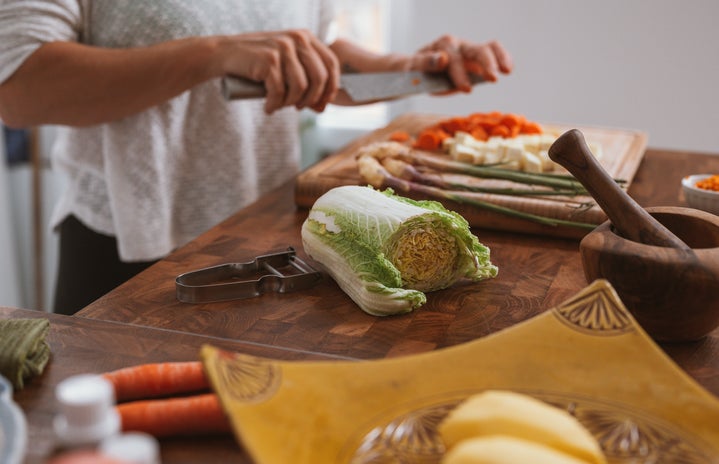Spending this year living in an apartment without a meal plan for the first time, I did not realize how much I would miss the dining halls. Don’t get me wrong, I enjoy getting to cook and eat the foods I like and grocery shopping is one of my favorite times of the week, but I never realized how much time you save not having to cook your own food and do your own dishes, and how much variety you truly do have as compared to eating your same meal-prepped food all week.
While I do miss Winner Winner Chicken Tender Dinner at Curtis and an occasional burger from Slay, I have really enjoyed the process of learning how to shop and cook for myself. I have had to learn the best ways to plan out my meals, shop smart, and take time to cook while also not burning through my time or money in the process. It has definitely been a learning curve and I still haven’t figured it all out, but I have found a few solid tips that work for me week after week.
While these 11 tips may work for me and my lifestyle, you may find that yours requires different strategies. That’s okay! Take what you like, leave what you don’t, and find out what works best for you over time.
- Plan (tentatively) your meals for the week and write out a grocery list – We all know how easy it is to go into a grocery store and grab anything and everything that looks delicious, especially when we make the mistake of going in hungry. To avoid guess work and stay on track with what you actually need to buy, take some time before you go shopping to write out what you plan on eating for breakfast, lunch, dinner, and snacks that week (more on this in #2). After you plan, look through your cabinets and fridge to see what ingredients you already have and don’t need to buy. Anything you do need goes on your grocery list and you can only buy what’s on that list when you go into the store (unless something exceptionally delicious catches your eye). This saves you from unnecessary spending on items you don’t need and unnecessary time wandering around the store not sure what to buy. Your meals may change as your schedule changes throughout the week but having an initial tentative plan is helpful in the shopping and cooking process.
- Meal prep – While meal prepping doesn’t work for everyone’s living situation or eating preferences, it helps me save lots of time and energy on deciding what to eat and on the actual cooking. I take time every Sunday or Monday to prep the meals I will be eating for lunch and dinner throughout the week. While it can sometimes get repetitive eating the same thing for a whole week, I find that if I switch up recipes from week to week, it doesn’t get that boring, especially if you are picking foods you enjoy. I also usually keep cans of tuna or a frozen pizza in the kitchen in case I want a break from my prepped food.
- Buy generic – I do all of my grocery shopping at Aldi because they have the cheapest yet highest quality generic groceries I have found. Their produce is fresh, they have organic options, and I’ve never had a bad experience with any of their products. They also use a unique bagging and shopping cart return method that saves plastic bags and keeps prices low for customers. Aldi typically has most of the things on my grocery list, but if I can’t find something, I just pop over to Target or Walmart to find the cheapest version there. If you don’t have access to Aldi, I still recommend buying the generic version of a product when you have the option at your preferred grocery store. More often than not, it tastes the same but costs so much less. If you can’t part with your brand names, stick with them only on the products that are tried-and-true and go generic on everything else.
- Don’t forget about your freezer – Something I learned from my mom is that you can freeze pretty much anything. Got fruit that’s about to go bad? Bread that may start to mold soon? Leftover pasta or soup you just can’t eat anymore? The answer is always freezer. I love eating frozen grapes and frozen banana slices for a sweet treat, and all you have to do is defrost bread and leftovers for food when you’ve run out.
- Keep pantry staples – It’s always helpful to have certain foods that you know will be in your kitchen for when you are looking for a tried-and-true snack, need a quick meal, or have run out of the meals you planned on for the week. Here’s a list of a some of my staple ingredients:
- Chickpeas: use for homemade hummus or roasted in the oven
- Canned tuna: can’t go wrong with a tuna sandwich
- Peanut butter: a.k.a. what gets me through the day
- Chocolate chips: to eat with the peanut butter duh, or to make cookies in a pinch
- Bread: sandwich or naan style
- Pasta: spiral pasta is the best but you do you with the noodles
- Rice: goes with literally anything
- Granola: easy breakfast or sweet treat
- Oat milk: stays fresh longer than dairy milk and is still creamy, use it for cereal, baking, or sauces
- Collect fool-proof recipe ideas – Whether it’s recipes you bring from home or ones you find while cooking your way through college, it’s good to have a few go-tos for when you don’t know what to make. Finding recipes that work with the ingredients you like and have can be challenging, so if you’re in a slump, fall back on some old favorites. I collect my recipes on Pinterest and in a recipe box for handwritten favorites.
- Research substitutes for ingredients you don’t have – Whether you realize you forgot an ingredient after you begin cooking or find out that a recipe you want to make calls for only a small bit of an obscure ingredient, use the internet to look up ingredient substitutes. Applesauce can be used for eggs, milk and lemon juice can replace buttermilk, and spices can often be interchanged. You can find a substitute for almost anything if you Google it.
- Ask for grocery store gift cards on birthdays and holidays – This is something I did for Christmas and it saved me from paying for groceries for the whole first month back after winter break!
- Only buy leafy greens if you have a plan to eat them all – The number one ingredient I waste is leafy greens. I enjoy eating greens and want the nutrients they provide, but unless I have specific recipes in mind for them, I never eat them all before they go bad. Some of my favorite ways to use up greens if they’re about to go bad include adding them to rice and pasta or making pesto to put on pasta and other dishes.
- Take advantage of events that provide free food – The best way to not have to worry about time or money in relation to food is to attend events that provide it for you. College is full of organizations that provide free food, whether it’s to get you to attend their event or to share their culture. These events give you a break from cooking while at the same time providing you with some kind of educational, cultural, or entertaining piece that is super rewarding. What other time in your life will you be in walking distance from free food?
- Utilize your campus food pantry – While it’s not something I practice often, many colleges have a food pantry for students where you can get many dry goods, snacks, and microwavable meals for free. The Denison Food Pantry is in the basement of Higley and is open Mondays and Wednesdays from 4:30-6:30pm. Last week they had Cheez-Its so I highly recommend.
Without further ado, let’s get cookin’! And eatin’!



